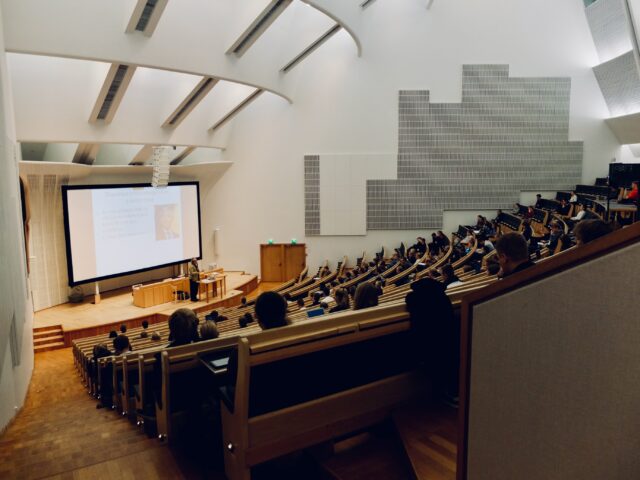Housing costs in Canada are making international students more vulnerable to exploitation, write York University Professor Tania Das Gupta and YorkU Assistant Professor Yvonne Su. International students are particularly vulnerable to discrimination, rent gouging, human rights abuses, and sexual harassment. Some landlords target new international students because they may be less likely to complain about their living conditions, explain Gupta and Su, and may include discriminatory preferences in their ads for individuals, offer sub-standard housing, and/or demand large upfront payments. The authors write that accommodation is an issue as rental prices increase and call for structural changes by governments and postsecondary institutions.

Top Ten News
May 2, 2023
Seneca Polytechnic and York University have respectively announced and opened new facilities that are designed with equity, diversity, inclusion, and sustainability principles in mind. YorkU’s newly opened School of Continuing Studies building and Seneca’s planned Health and Wellness Centre are both designed to meet LEED Gold standards with the intent of achieving net zero in the future. YorkU’s building has a twisted design that symbolizes the evolution of postsecondary education and features inclusive design features such as guide rails for students with sight impairment, a lactation room, and a prayer and meditation room. The Seneca Health and Wellness Centre will incorporate Indigenous architectural forms with a design that draws on the medicine wheel and the drum circle. The facility will follow green building practices such as rainwater harvesting, solar energy, and the use of renewable building materials.
The Canadian Resident Matching Service (CaRMS) has released high-level data from this year’s R-1 Main Residency Match (R-1 match). Graduating Canadian medical students and international medical graduates apply through CaRMs each year in hopes of securing a post-graduate training spot. 3,422 graduating students and physicians were matched to residency training programs this year and a total of 2,850 Canadian medical graduates were matched to residency programs. CaRMS reports that 555 international medical graduates and 17 US medical graduates were also matched to residency positions, a marked increase from the 439 matched in 2022. The Government of Saskatchewan issued a statement noting that it is the “only jurisdiction in Canada to have all family medicine seats filled in the first round” and praised the University of Saskatchewan’s College of Medicine for its part in this outcome. The 2023 CaRMS Forum data set is expected to be posted later this week.
In a recent article published in The Professional Geographer, Okanagan College Professor Terence Day shares the results of a preliminary investigation into fake citations and references generated by ChatGPT. Day found that the ChatGPT artificial intelligence (AI) chatbot tended to generate fake academic citations and references through a predictive process rather than citing real sources. This has implications for several parts of the sector, including the publishing process–where Day notes journal editors will need to be vigilant about the quality and accuracy of articles that were developed with ChatGPT–and student academic integrity, where this fake citation tendency provides one method of identifying student misuse of the chatbot. The author concludes that enthusiasm about the chatbot should be “tempered with a more nuanced and cautious approach” to its usage in teaching and learning.
Mount Allison University has launched two international field schools in Scotland and Italy, where students will be able to take advantage of fully or partially funded global experiences. In Scotland, drama students will have the opportunity to visit the National Library of Scotland archives to support their work on an experiential learning project, while Screen Studies students will be able to complete research at the British Film Institute. In southern Italy, archaeological research students will have the opportunity to complete international archaeological work exploring the Torre Mordillo site.
Twenty-four cégeps recently launched a podcast that highlights the role that men can play in the early childhood education (ECE) sector. The podcast–titled Éducateur : un jeu d’enfant?–is an educational tool that deconstructs myths, provides discussion points to start conversations about men working within the field, and encourages more men to pursue ECE work. The podcast is hosted by Cégep de Sherbrooke Instructor of Techniques d’éducation à l’enfance Félix Morin and currently has five episodes that touch on the reasons behind the lack of men in the field and possible solutions, the challenges that men face in ECE professions, and the experiences of that those who are already in the field.
The University of Saskatchewan Vaccine and Infectious Disease Organization (VIDO) and the Switzerland-based Vaccine Formulation Institute (VFI) have established a partnership to support a rapid and unified response to future pandemics. The partners will work together to develop and test vaccine formulations for emerging pathogens. “Preparing for future pandemics requires a co-ordinated, international effort,” explained USask VIDO Director Dr Volker Gerdts. “We are delighted to further our partnership with VFI. The technologies developed will help ensure a rapid response to the next emerging infectious disease.”
Concordia University’s John Molson School of Business has launched John Molson Perspectives, a knowledge hub that will make business research more accessible for the business community. The hub will curate news stories, insights, and other content developed by student and faculty researchers for businesses. The first round of articles focuses on topics such as international entrepreneurship and telemedicine. “The platform addresses a need expressed by our peers and the business community to access the practical output of our research projects,” explained editor-in-chief Ehsan Derayati. “A primary goal is to bridge our research activities and the business community’s needs through creating and disseminating practical, relevant, and impactful knowledge. We want to offer data-informed, research-backed insights to be shared with executive teams.”
In a recent study for the Society for Research in Higher Education, University of Cambridge researchers Dr Katy Jordan and Dr Sally Po Tsai found that searching academic literature while sorting by relevance introduces bias. These algorithm-led literature searches rank content based on factors such as content, journal of publication, the author, and recency of citations in other scholarly literature, which Jordan explains are factors that have been found to be biased in favour of white, male, Western-based scholars while deprioritizing research by scholars who are women, of colour, in their early career, and/or from the Global South. In an editorial for University World Affairs, Jordan outlines some of the actions that researchers, universities, and journals and database developers can take to counter this bias.
Portage College has partnered with Northern Lights Public School (NLPS) to expand dual credit programing opportunities for high school students. In addition to the dual credit courses Portage already offers NLPS, students will now be able to take courses such as Intro to Computers and Info Systems, which is delivered online. “These programs provide an excellent opportunity for students to earn post-secondary credits while still in high school, and we are proud to be part of their educational journey,” said Portage Dean of University Studies Don Moore.
